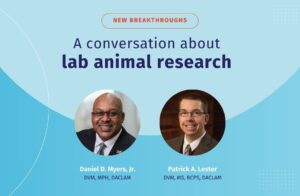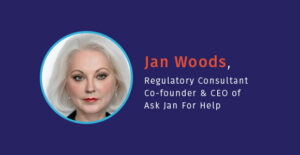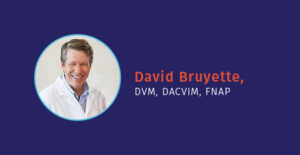The Epicur team is so excited to have the ACVO/Epicur National Service Animal Eye Exam Event back this year! It’s such an important and impactful event, and it is fully philanthropic. Veterinary ophthalmologists and their staff volunteer their time during the month of May to provide free ocular exams for registered service animals. This event highlights the compassion and care of the veterinary community, which is why we’re proud to be the namesake sponsor again this year!
To highlight just how much this event means to not only the pet owners but also the participating clinics, we asked some of the ophthalmologists to share why they volunteer. Dr. Micki Armour, VMD, DACVO, owner of Armour Veterinary Ophthalmology at Friendship Hospital for Animals in Washington, D.C. shares more about her work in ophthalmology and the impact the ACVO event has on her each year.
What led you to pursue a career in veterinary medicine?
I always grew up with a lot of animals. It’s a big part of who I am. On the first day that I was in a veterinary hospital as an assistant a dog was hit by a car. It was really traumatizing to see this dog needing help so desperately. Once he had been resuscitated, he was able to walk out the front door. It was amazing to see how a veterinary team can support a dog that was so critical.
And then what ultimately led to your specialty in ophthalmology?
I completed a small animal rotating internship at Red Bank Animal Hospital. The ophthalmologist was really a wonderful mentor for me, showing me how you can blend both medicine and surgery into a fantastic career.
The eyes are so detailed and very intricate. They can tell you about changes in the rest of the body. Just a quick evaluation can really change a lot about your knowledge of the dog or cat systemically.
It’s really interesting that you still collaborate with human ophthalmologists. How does that influence your own work? Has it influenced any patient cases?
One of the biggest things that’s important to me is staying at the forefront of excellent patient care and up to date on the literature, as well as the connectivity with the human field and how the veterinary and the human fields can benefit one another in terms of knowledge and technology. I often go to human ophthalmology meetings and conferences to look at our cases from a different perspective.
Through that connection, I was able to forge a friendship with human ophthalmologists at Johns Hopkins University. We have been working and collaborating to find solutions for corneal endothelial disease, which is like Fuchs disease in humans where you might need a corneal transplant. That is one area of interest for me.
We also have been working on trying to localize an area within the eye for the placement of a glaucoma sensor device. It would be like a Bluetooth-connected device to your phone that lets you know a dog’s eye pressure.
Want more animal eye health resources?
Check out our pet eye health page and get our free eye health handout—it’s great for pet owners and vet clinics!

You stay highly involved in the veterinary ophthalmology community—regularly attending the ACVO conferences and being an Associate Member of the American Academy of Ophthalmology, as well as volunteering for the eye exam event.
How long have you been participating in the event?
I’ve participated every year since 2012 that has been available. ACVO, or the American College of Veterinary Ophthalmologists, connects with us once we become boarded. A big reason most people go into veterinary medicine is because of their compassion for animals. One of the things that I personally very much enjoy is being able to give back to my community in different ways. This service is so beneficial to the members of the community.
It’s obvious that this event has a huge impact on you as well as the patients. What is it about the event that is so special to you?
It’s wonderful, in my opinion, to connect with the clients and to be able to see what a huge impact these animal companions can have in just everyday routines and lifestyles. Their service is such a gift, so it’s nice to be able to return that gift.
I love the personal stories – hearing about the diabetic alert dog who, when its human partner was a mile down the road, ran down the road to alert the partner that they were having a crisis; the search and rescue service dog who can detect a lost child; the dog whose owner has MS so the dog will wake her up in the morning and hand her slippers, her keys, will even open the door to her bedroom and will pull out drawers so that she can get dressed.
Those are things that you do not expect to hear. It’s incredible how these dogs are such an integral part of the day-to-day lives of their human partners.
Those are amazing stories! You must meet so many incredible owners who bring their companions in for exams.
It’s also the whole family. For the diabetic alert dog, the child is diabetic, but the mother had such a sense of relief knowing that the dog will be able to alert both the child but also the whole family if there is something not quite right. And the same happens with seizure alert dogs. They treat the dog as a complete member of the family and with the utmost respect.
The typical thought when someone hears ‘service animal’ is to think of a dog, which sounds like you see a lot of but are there any other types of service animals you’ve treated during the event?
Oh, for sure! I had a service alpaca who would go and visit people in the hospital and the alpaca itself was visually impaired. There are search and rescue horses who ride into the wilderness to search for missing people.
Do you have any favorite cases that you’ve seen through the years of the event?
It’s hard to choose but the main exams that I like to do are for the dogs that serve our country. We set up whole days to evaluate explosive detection canines. We also make sure that the dogs that are going abroad to serve our country are healthy so that they can complete their tasks.
In the past, we used to incorporate cardiology with the ophthalmology exams so that when patients came in, they got cardiac screens at the same time. We don’t have a cardiologist on staff currently, but hopefully, in the future, we will be able to provide this service again.
That’s a great example of your true compassion and why you’re in the veterinary industry. The professionals in this field go above and beyond for their patients.
It’s fun to be able to do things like that and branch out beyond my day-to-day which is caring for dogs and cats. On my days off, I’m able to will work with the National Aquarium and the National Zoo. I enjoy donating time to ophthalmic exams for Owl Moon Raptor Rescue and ensuring the birds of prey can be released when they’re rehabilitated.
What a great way to spend your days off! Any last thoughts on the event?
I’m just very happy that Epicur Pharma is promoting this event. Epicur’s customer service is an excellent resource for my clinic and clients.
Thanks, Dr. Armour! We’re thankful for your time today and your dedication to veterinary ophthalmology!
Here are some other posts you may enjoy. See our full library articles on our blog.

Innovating Pain Management in Veterinary Research Medicine
Epicur Pharma recently partnered with two passionate veterinary research professionals, Dr. Daniel D. Myers Jr., DVM, MPH, DACLAM, and Dr. Patrick A. Lester, DVM, MS, BCPS, DACLAM, to bring a groundbreaking analgesic solution to market for research animals: Buprenorphine Extended Release. We sat down with them to reflect on their path to partnering with us and their hopes for the future of veterinary medicine.

Controlled Substances 101: How & Why You Must Comply! Parts 1 and 2
December 8 | 7 p.m. ET RACE-Approved CE Credit Hours: 2Free to attend Attendees will learn how to improve security, prevent theft per DEA regulations and proactively prepare for a DEA audit and best practice time saving suggestions from a previous veterinary practice owner, consultant & public speaker/educator, who has worked with Veterinarians cited by the DEA. Save My Seat

Introduction to Cancer Genomics and Precision Medicine for Dogs
April 14 | 8 p.m. ET RACE-Approved CE Credit Hours: 1Free to attend In this presentation, you will learn about cancer genomic testing for the veterinary patient and how tumor genetic biomarkers can guide and enhance diagnosis and treatment protocols. In addition, you will learn how genomics testing can offer better prognostic projections based on genetic mutations present in a particular tumor. Watch It Now


